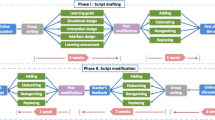Abstract
Facilitating reflection of pre-service teacher is becoming a more and more important topic in teacher education. There are a number of social media tools which can support teacher professional development. It also enables us to examine the development of individuals’ reflective process and group dynamics. In this study, 50 pre-service teachers were involved to write scripts collaboratively using wikis and they were encouraged to reflect upon their written texts and script-writing strategies during the online collaborative writing process. In particular, epistemic network analysis is adopted in order to characterize learners’ reflection dynamics during the two phases of collaborative script writing. The research results show that the characteristics of reflection type in different phases are different. Also, teachers tend to reflect on the content and methods of the group in the first phase; while in the second phase, they tend to reflect on the group methods and personal gains. Using content analysis and epistemic network analysis, this paper characterize the development of reflection during collaborative writing activities and provides reference for the cultivation of reflection among pre-service teachers.
Access this chapter
Tax calculation will be finalised at checkout
Purchases are for personal use only
Similar content being viewed by others
References
Beyer, L.E.: Field experience, ideology, and the development of critical reflectivity. J. Teach. Educ. 35(3), 36–41 (1984)
Blomberg, G., Sherin, M.G., Alexander, R., et al.: Understanding video as a tool for teacher education: investigating instructional strategies to promote reflection. Instr. Sci. 42(3), 443–463 (2014)
Colton, A.B., Sparks-Langer, G.M.: A conceptual framework to guide the development of teacher reflection and decision making. J. Teach. Educ. 44(1), 45–54 (1993)
Csanadi, A., Eagan, B., Kollar, I., Shaffer, D.W., Fischer, F.: When coding-and-counting is not enough: using epistemic network analysis (ENA) to analyze verbal data in CSCL research. Int. J. Comput.-Support. Collaborative Learn. 13, 419–438 (2018)
van Es, E.A., Sherin, M.G.: Mathematics teachers’ “learning to notice” in the context of a video club. Teach. Teach. Educ. 24(2), 244–276 (2008)
Good, J.M., Whang, P.A.: Encouraging reflection in preservice teachers through response journals. Teach. Educ. 37(4), 254–267 (2002)
Hatton, N., Smith, D.: Reflection in teacher-education - towards definition and implementation. Teach. Teach. Educ. 11(1), 33–49 (1995)
Krutka, D.G., Bergman, D.J., Flores, R., et al.: Microblogging about teaching: Nurturingparticipatory cultures through collaborative online reflection with pre-service teachers. Teach. Teach. Educ. 40, 83–93 (2014)
Mckinney, M.: Preservice teachers’ electronic portfolios: integrating technology, self-assessment, and reflection. Teach. Educ. Q. 25(1), 85–103 (1998)
Potter, G.: Facilitating critical reflection on practice through collaborative research. Aust. Educ. Res. 28(3), 117–139 (2001)
Huang, R., Li, Y.: What matters most: a comparison of expert and novice teachers’ noticing of mathematics classroom events. Sch. Sci. Math. 112(7), 420–432 (2012)
Shaffer, D.W.: Quantitative Ethnography. Cathcart Press, Madison (2017)
Shaffer, D.W., Graesser, A.: Using quantitative model of participation in a community of practice to direct automated mentoring in an ill-formed domain. In: Intelligent Tutoring Systems (ITS), Pittsburgh, PA (2010)
Author information
Authors and Affiliations
Corresponding author
Editor information
Editors and Affiliations
Rights and permissions
Copyright information
© 2019 Springer Nature Switzerland AG
About this paper
Cite this paper
Yi, Y., Lu, X., Leng, J. (2019). Exploring the Development of Reflection Among Pre-service Teachers in Online Collaborative Writing: An Epistemic Network Analysis. In: Eagan, B., Misfeldt, M., Siebert-Evenstone, A. (eds) Advances in Quantitative Ethnography. ICQE 2019. Communications in Computer and Information Science, vol 1112. Springer, Cham. https://doi.org/10.1007/978-3-030-33232-7_22
Download citation
DOI: https://doi.org/10.1007/978-3-030-33232-7_22
Published:
Publisher Name: Springer, Cham
Print ISBN: 978-3-030-33231-0
Online ISBN: 978-3-030-33232-7
eBook Packages: Computer ScienceComputer Science (R0)




